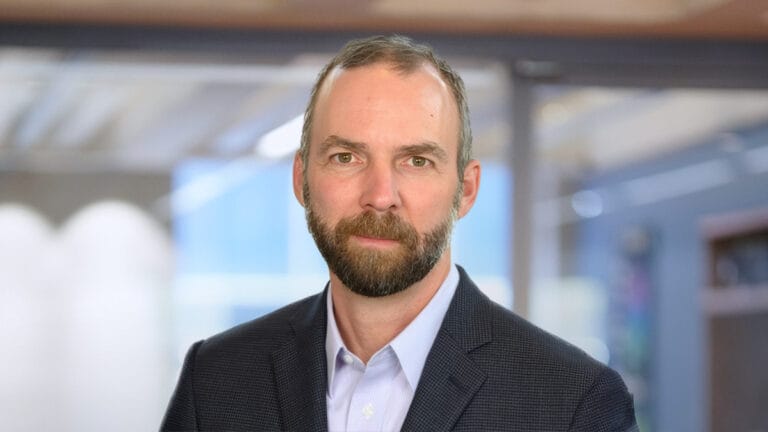

Seshani Bala, GC at KPMG New Zealand – Putting people first, not letting talent go in a crisis
During a recession, businesses often slash headcount as a cost-saving move. Bala believes this a mistake. “It’s important to think long-term and have a committed strategy to retaining key talent,” she says.
“Avoid chaotic, knee-jerk reactions at all costs, as these have long-term impacts on your brand, reputation and future resourcing. People are the foundation of every business. There will always be fierce competition and demand for outstanding talent regardless of a cyclical market, and I say this as a former private equity lawyer who began my career during the GFC.”
Market peaks and troughs are as natural as summer and winter. As Bala points out, slow patches provide an opportunity to upskill and diversify existing talent, to become more agile and optimize legal services through technology enablers and efficient processes.
“The best lawyers are recognized as high-value targets in the market and they know it. If they feel they are on a sinking ship that has lost momentum and vision, they are likely to explore other options,” she warns.
Corporate knowledge transfer can seriously hinder a business during already stressed times. Putting people first and leading with integrity while making tough decisions is critical in a crisis.
“It comes down to leading with empathy, clear and transparent communication, being supportive and keeping people motivated. We’re all in this together, and to quote Abraham Lincoln, ‘this too shall pass,’” Bala advises.
Margaret Maguire, GC at Fexco – Horizon scanning – being proactive, not reacting, especially after Covid
Keeping abreast of potential issues on the figurative horizon is the epitome of proactive law. “For Fexco, horizon scanning is a dedicated workstream that forms part of the wider group risk and compliance strategy,” says Maguire.
What exactly is horizon scanning? Maguire describes it as “keeping track of upcoming and prospective legislation on an ongoing basis and sharing details of any relevant prospective legislation with the legal team, the executive management and the wider business”. In other words, seeking out compliance and regulatory issues before they land on one’s desk.
The benefits of horizon scanning are extensive. Maguire points out that it enables companies to be ahead of any imminent regulatory changes that will impact operations. “We can put in place the necessary processes and procedures to ensure timely and cost-efficient compliance,” she says.
On a different note, horizon scanning is a perfect precursor to innovation, a chance to identify upcoming legislation developments and begin to ideate opportunities that could benefit such change. Maguire and her team are all over this, directly impacting new products and the services Fexco builds. “One recent example is Fexco’s development of PACE (the Platform for Analysing Carbon Emissions) which was born out of a recognition that regulation governing emissions and emissions reporting is likely to grow significantly in the coming years,” she says.
Danh Nguyen, Group General Counsel, Paysend Group – Navigating risk profiles of different geographical areas
During the past couple of years, Nguyen found himself facing a complex challenge – navigating risk profiles in different geographical areas. As Paysend is a fintech disruptor which offers financial transfers to over 170 countries across the globe, the requirement to keep abreast of the evolving regulatory landscape in each country was no mean feat. It required agile, creative thinking from the legal team, especially as the scope for risk is high.
Nguyen says remaining closely connected with colleagues, consultants and other subject matter experts in different regions was crucial to staying on top of potential risk. Being transparent with information and listening to others’ approaches to mitigating issues was a key learning for his team. He spent considerable time reviewing and revamping internal policies and procedures to make them more robust and agile. Doing so created more dexterous responses to regulatory changes and new requirements from regulators. He points out this also allowed the team to identify and plug any gaps.
Holding regular touch-base calls during the height of the pandemic ensured alignment of strategy and approaches to regulatory compliance. A silver lining of leveraging Paysend’s extensive network was efficient and effective horizon scanning, which Nguyen and his team will continue to do.
Teresa Allan, Vice President, GC & Ethics and Compliance Officer, Australia & New Zealand at Capgemini – Saving space for firefighting with the 60/40 rule
Saving space for firefighting is Allan’s hack to navigating a crisis. Allan operates by a 60/40 rule: allocating 60 percent of her time to current work and saving 40 percent for inevitable firefighting and managerial responsibilities. “From a personal perspective, it gives me the illusion of control because I have the space to be able to respond quickly and appropriately as the situation needs,” she says.
As a VP and GC, Allan is a designated escalation point for matters. By scheduling time for such matters, Allan minimizes the risk of her being the bottleneck. She says it also means she’s less likely to drop the other balls she’s juggling when she has to respond to something urgent.
The 60/40 rule allows Allan’s team to operate in a more relaxed and confident manner. The legal team take comfort in knowing she is available to bounce quick queries off and to provide support. The wider business knows matters won’t disappear into a long escalation cycle up to Allan.
Logistically, Allan recommends blocking out time in your calendar so others don’t fill it up and explaining to team members that “although you have time, you still can’t drop everything at a minute’s notice”. Creating a culture where the legal team is cognizant of the GC’s time and scheduling regular catchups is the way to go.
Christina Hardy, GC and Company Secretary at Opal Healthcare – Wicked problems, not everything can be solved
Wicked problems are issues that fundamentally cannot be solved despite one’s best efforts. “I wish I had known about them my entire career,” says Hardy. Lawyers are constantly faced with issues to fix; being able to identify when one is ‘wicked’ saves time, stress and headaches.
In-house counsel like Hardy found themselves inundated with wicked problems during the pandemic. Working in residential healthcare, Hardy faced some complex challenges she could not change, such as elderly people falling ill and passing away. Learning to identify what was within her control and what was beyond it, allowed her team to focus their energy where it could be best utilized.
Hardy learned about wicked problems in 2013 when studying for an MBA. She also acquired handy decision-making tools. “I had been working in law for a couple of decades and had never paid much attention to the concept of legal decisions,” she says. The MBA completely changed that. “We’re lawyers, our job is to provide advice. We tend to say we don’t make decisions, that we just advise, but the fundamental thing is we do make decisions.”
She learned that it pays to consider how one approaches decisions. For instance, before sinking one’s teeth into an issue, deliberate if the issue at hand should be handled individually, consulted upon or delegated.
Malgosia Zietara-Miller, Director, Group Head of Legal at Personio – Navigating being a unicorn in a recession
When Zietara-Miller joined Personio eight months ago, the company was experiencing a shift in operation. A unicorn company, Personio was used to exponential growth pre-pandemic. “We used to go full speed ahead with everything we did and used contractors and external support to deliver in a short period of time. With the recession, we needed to become much more cost-conscious – which is normal for a company of our size – and to be able to cover as many topics in-house as we can rather than rely on external advice.”
Becoming cost-conscious requires more specialization within the legal team. “Individuals should become experts in their areas and focus on automation of processes to allow lawyers to focus on actual legal work rather than repetitive, often administrative tasks,” says Zietara-Miller. Establishing a subject matter expert and automation balance is a work in progress. It also allows the identification of any pain points that should be eliminated from day-to-day processes.
“As for opportunities, difficult times provoke creativity and thinking outside of the box. We are continuously developing our products and are focused on how we can help our customers in this economic downturn,” says Zietara-Miller.
Faten Awad, General Counsel at MacKillop Family Services – Leveraging the business
The wider business has a knowledge base and practical experience that lawyers should leverage in any industry, yet counsel often forget this.
MacKillop Family Services provides foster care, family support, alternative education and disability services in NSW, WA and VIC. The pandemic heightened the need for support across Australia as children and families felt the repercussions of lockdowns and a health crisis.
Awad found herself in the midst of evolving regulatory changes and had to leverage her colleague’s knowledge to better equip herself with an understanding of the potential impacts of change. “Even though the rest of the organization are not lawyers, they understand the legislation they’re working in, and they understand the environment they’re working in.”
She says the practicality of talking through a situation allows one’s legal advice “to come alive, and it’s more practical for business”. Why? “Because it’s more relatable for them, and you’re giving them what they want rather than what you think as a lawyer you need to provide.”
Tapping into the wider business has fostered strong connections and created allies for Awad. For many counsel, there is untapped potential in the connections right in front of them.
Put your own oxygen mask on first
You can’t save anybody if you can’t save yourself. For leaders, knowing this is of critical importance. Managing the demands of the executive team, clients, the board, shareholders, your team and family and friends, is like real-life Jenga. If a leader is operating on shaky ground, all their metaphorical blocks can come crashing down. Self-awareness and self-care are crucial if you want to be a great leader.
Maguire’s advice is to “find what helps you burn off the crazy”. For her, it is running. Setting goals such as 10km races helps to keep her honest and lacing up her sneakers, even on busy days. She also advises delegating and not being ashamed that you can’t do everything, whether that is at home or in the office. Zietara-Miller also advocates exercise. “If I get 40 minutes cycling, the adrenaline and endorphins kick in. I’m a much nicer person and we have a better work day.” Creating time with her family that work cannot impinge on is also crucial.
Hardy is into meditation. “I have practiced 15 minutes a day for five years. As a lawyer, in complex, fast-paced environments where you need clarity of thought to make decisions there’s nothing that beats it.” Nguyen makes space for himself by not having his work emails close at hand, be that at the gym or home, and recommends having things to look forward to outside of work such as a weekend away or a theatre show.
Being a leader and a lawyer in a crisis
When a crisis hits, General Counsel (GC) and Chief Legal Officers (CLO) find themselves juggling their responsibilities as a leader with trying to retain their human touch. People want empathetic leaders who prioritize their team’s wellbeing as much as the work that needs to be done, especially when the going gets tough.
Every leader has a unique way of striking the balance between being a shoulder to lean on and being a boss. GC Allan prioritizes making space for her team to open up to her. “They know I’m available to bounce things off for them to vent, and they need that support.” She also notes the importance of thinking from other people’s perspectives and says Covid really brought this to light when people were struggling to balance home-schooling young children with working from home. “Have empathy and compassion for others’ situations.”
Hardy’s hot tip is camaraderie. “Remember to have fun with your team,” she says. “At the end of the day, you’ve got eight hours a day – realistically, more like 10 to 12 for lawyers – with your colleagues, so try and have a laugh together.”


